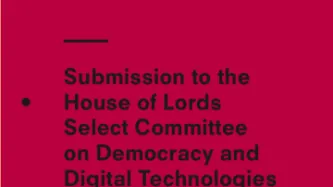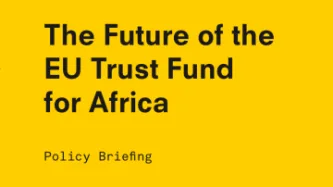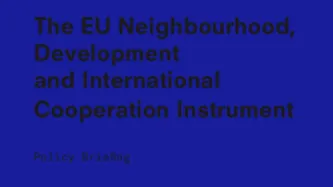Search
Content type: Advocacy
PI is increasingly concerned that democratic participation can be inhibited by novel and unhindered surveillance both by governments and companies. To safeguard our rights, earlier this year, we launched our work programme, Defending Democracy and Dissent, which aims to investigate the role technology plays in facilitating and/or hindering everyone's participation in civic society.
This submission to the House of Lords covers PI’s views on:
How digital tech has changed the way…
Content type: Explainer
Abstract
Over the past few years, smart phones have become incredibly inexpensive, connecting millions of people to the internet for the first time. While growing connectivity is undeniably positive, some device vendors have recently come under scrutiny for harvesting user data and invasive private data collection practices.
Due to the open-source nature of the Android operating system vendors can add pre-installed apps (often called “bundled apps” or "bloatware") to mobile phones.…
Content type: Advocacy
Earlier this year, the UN Special Rapporteur on freedom of expression called for an “immediate moratorium on the global sale and transfer of private surveillance technology”, warning that “unlawful surveillance continues without evident constraint”, is leading to arbitrary detention, torture and possibly to extrajudicial killings. Without urgent action, there is every reason to believe that the situation will only get worse for people around the world. At Privacy…
Content type: Advocacy
Agreed in 2015, the EU Trust Fund for Africa uses development aid and cooperation funds to manage and deter migration to Europe. It currently funds numerous projects presenting urgent threats to privacy, including developing biometric databases, training security units in surveillance, and equipping them with surveillance equipment. There has been no decision made about the future of the Fund pending the outcome of negotiations on the EU's next budget.
This paper…
Content type: Advocacy
The Neighbourhood, Development and International Cooperation Instrument (NDICI) is a external instrument proposed under the EU's next 2021-2027 budget. It will provide funding for surveillance, border security, and migration management projects in third countries currently undertaken by a number of projects across various funds which are to form part of the NDICI. Several raise significant concerns regarding the right to privacy.
This paper summarises the NDICI and provides a…
Content type: Advocacy
This report, which was authored by Lorand Laskai, who is a JD Candidate at Yale Law School, provides an overview of the surveillance technology and training that the Chinese government supplies to countries around the world. China, European countries, Israel, the US, and Russia, are all major providers of such surveillance worldwide, as are multilateral organisations such as the European Union. Countries with the largest defence and security sectors are transferring technology and…
Content type: Advocacy
The UK government's Department for Digital, Culture, Media and Sport, along with Government Digital Services, made a Call for Evidence on Digital Identity.
In our response, Privacy International reiterated the need for a digital identity system to have a clear purpose, in this case to enable people to prove their identity online to access services. We highlighted the dangers of some forms of ID (like relying on a centralised database, unique ID numbers, or the use of biometrics). The…
Content type: Examples
A new investigative report from Sharona Coutts at Rewire exposed how anti-choice groups, including at least one adoption agency, were resorting to using a technology called "geofencing" to find and then target individuals they believe are considering abortion, with targeted ads.
Two groups, a clearinghouse that operates many crisis pregnancy centers and a large adoption agency called Bethany Christian Services, were reported to have hired Copley Advertising to provide them with this…
Content type: Examples
Ahead of the Irish referendum to amend the Constitutions of Ireland to allow the parliament to legislative for abortion which took place in May 2018, Google decided to stop all advertising relating to the referendum on all of its advertising platforms, including AdWords and YouTube.
This followed decisions by Facebook to no longer accept advertising relating to the referendum funded by foreign organisations outside Ireland, and Twitter not allowing any advertising in relation to the…
Content type: Examples
Bethany Christian Services, an international pregnancy support and adoption agency, is launching a programme with Copley Advertising to send targeted ads to individuals visiting Planned Parenthood clinics, abortion clinics, methadone clinics and high-risk areas (AHPA). The targeting will be done through the use of geo fencing based on smartphones located within the selected locations.
Source: https://www.liveaction.org/news//adoption-agency-send-pro-life-ads-smartphones-inside-abortion-…
Content type: Examples
Denmark released 32 prisoners as part of an ongoing review of 10,700 criminal cases, after serious questions arose regarding the reliability of geolocation data obtained from mobile phone operators. Among the various problems with the software used to convert the phone data into usable evidence, it was found that the system connected the phones to several towers at once, sometimes hundreds of kilometres apart, recorded the origins of text messages incorrectly and got the location of specific…
Content type: Advocacy
Privacy International's submission to the consultation initiated by the UN Special Rapporteur on counter-terrorism and human rights on the impact on human rights of the proliferation of “soft law” instruments and related standard-setting initiatives and processes in the counter-terrorism context.
In this submission Privacy International notes its concerns that some of this “soft law” instruments have negative implications on the right to privacy leading to violations of other human…
Content type: Examples
US campaigners supported by the Catholic church are promoting the app Femm, which collects sensitive data about women's sexual lives and aim to scare women from using hormonal birth control, in rural Nigeria. Femm received a $100,000 from the Papal Foundation to promote their app.
https://www.theguardian.com/society/2019/jul/15/femm-menstruation-tracking-app-nigeria-anti-pill-campaignersus-
Author: Jessica Glenza
Publication: The Guardian
Content type: Examples
Following pressure from civil society and pro-abortion groups, Facebook announced on May 8th 208 a ban on foreign ads related to the Irish referendum on abortion. Facebook said they were being consistent with Irish electoral law.
https://www.irishtimes.com/business/technology/facebook-bans-foreign-ads-for-eighth-amendment-referendum-1.3487895
Author: Ciara O'Brien
Publication: Irish Times
Content type: Examples
Una Mullally writes about the online campaign led by the anti-abortion groups Protect the 8th and Undecided8 and their targeting of undecided voters in Ireland. She spoke to Facebook about their role in the spreading of those campaign and to campaigner Gavin Sheridan, who has demanded transparency to control the role of big tech platforms in democratic processes in Ireland.
https://www.irishtimes.com/opinion/the-poisonous-online-campaign-to-defeat-the-abortion-referendum-1.3486236
Author: Una…
Content type: Examples
In this piece Gavin Sheridan, transparency campaigner and CEO of legal intelligence company Vizlegal, argues for the need for a regulatory oversight to control the impact big tech companies and force them to be more transparent.
https://www.theguardian.com/commentisfree/2018/may/13/ireland-abortion-mark-zuckerberg-referendum
Author: Gavin Sheridan
Publication: The Guardian
Content type: Advocacy
On 28 August 2019 PI joined International Privacy Network partner Asociación por los Derechos Civiles and others in writing to the Directors of Public Policy for Latin America at Facebook, Google, and Twitter. The letters outline what steps are needed to make the social media giants' ad archives effective. Earlier this year organisations across Europe, led by the Mozilla, wrote to the companies with similar guidelines - the letters sent today say that equivalent steps should be taken for ad…
Content type: Examples
A 17-year-old Palestinian resident of Lebanon, Ismail B. Ajjawi, was deported shortly after he arrived at Boston Airport, where he was due to start attending Harvard University the following week.
Immigration officers subjected him to hours of questioning — at one point leaving to search his phone and computer — according to a written statement by Ajjawi. According to the student, his visa was revoked because of content posted by some social media contacts.
The student alleges that…
Content type: Advocacy
RESPONSE OF PRIVACY INTERNATIONAL TO THE CONSULTATION ON THE GOVERNMENT’S PROPOSED RESPONSE TO THE RULING OF THE COURT OF JUSTICE OF THE EUROPEAN UNION ON 21 DECEMBER 2016 REGARDING THE RETENTION OF COMMUNICATIONS DATA
[Full response below]
Introduction
The consultation is in response to the judgment in Tele2 Sverige AB v Post-och telestyrelsen (Case-203/15) and R (Watson) v Secretary of State for the Home Department (Case C-698/15) [“Watson judgment”].
The case concerned…
Content type: Explainer
In 2000, the Government told Parliament that the Regulation of Investigatory Powers Act 2000 (RIPA) was the total extent of surveillance powers that were needed. However, within weeks of RIPA receiving Royal Assent, a report from UK law enforcement was leaked, stating that the power the Government truly wanted was companies to retain communications data on all their users.
Immediately after 9/11 as governments around the world over-reached with new pieces of…
Content type: Examples
A February 2019 study of facial recognition systems found that these systems are not designed with transgender and nonbinary people in mind. Researcher Os Keyes studied 30 years of facial recognition research, including 58 separate research papers, and found that more than 90% of the time researchers followed a binary gender model, more than 70% of the time viewed gender as immutable, and, in gender-specific research, more than 80% of the time viewed gender as a purely physiological construct.…
Content type: Examples
In 2018, Brian Hofer, the chair of Oakland's Privacy Advisory Commission, filed suit after police wrongfully stopped him at gunpoint because their automated license plate recognition system, supplied by Vigilant Solutions, indicated that the rental car he was driving had been stolen. The car had in fact been stolen some months earlier, but been recovered. Despite such errors, police claim that the technology has helped reduce crime, identify stolen vehicles, and identify and arrest suspects.…
Content type: Examples
In 2018, to prove how easily soldiers' real-world actions can be manipulated via social media, researchers at NATO's Strategic Communications Center of Excellence (StratCom) conducted a red-team exercise in which they "catfished" members of the armed forces. Using information collected from Facebook profiles and people search websites, the researchers created targeted advertising to draw soldiers to phony Facebook pages mimicking those service members use to connect with each other. In the…
Content type: Examples
In February 2019, after investigative journalists used social media posts to investigate the country's hidden role in conflicts such as those in Ukraine and Syria, Russia began moving to ban its soldiers from posting any information that would expose their whereabouts or their role in the military. The ban would include photographs, video, geolocation data, and other information, and prohibit soldiers from sharing information about other soldiers and their relatives.
https://www.reuters.com/…
Content type: Examples
In 2018, repossession services in the US were experiencing a boom in business as the number of Americans failing to keep up with their car payments reached its highest point since 2012. One of these, Ohio-based Relentless Recovery, was increasing its hit rate by equipping its agents' vehicles with cameras to help it build a database of every license plate in the state along with the locations where the vehicles may be easily found. Repo agents collect most of the billions of license plate scans…
Content type: Examples
In February 2019, the UK Home Office told the Independent Chief of Borders and Immigration that it was planning to build a system that could check and confirm an individual's immigration status in real time to outside organisation such as employers, landlords, and health and benefits services. Lawyers and human rights campaigners expressed concerns that the project had received no scrutiny or public discussion, and that the Home Office's record suggested the result would be to unfairly lock…
Content type: Examples
In February 2019 Gemalto announced it would supply the Uganda Police Force with its Cogent Automated Biometric Identification System and LiveScan technology in order to improve crime-solving. LiveScan enables police to capture biometric data alongside mugshots and biographical data. CABIS speeds up the biometric matching process by mapping distinctive characteristics in fingerprints, palm prints, and facial images. The Ugandan police will also pilot Gemalto's Mobile Biometric Identification…
Content type: Examples
In November 2018, Italy's Data Protection Authority advised against a proposal from the country's Interior Minister, Matteo Salvini, to replace "parent 1 and parent 2" on children's national ID cards with "mother and father". Salvini, who campaigned for election earlier in 2018 on a socially conservative platform, also called for gender-specific terms throughout the application and for applications submitted on behalf of under-14s to include permission from both parents. The DPA argued that the…
Content type: Examples
In February 2019 BuzzFeed News reported that one of the largest home DNA testing companies, FamilyTreeDNA, had formed an agreement with the FBI to grant the agency access to its database of more than 1 million genetic profiles, most of which were supplied by consumers with no thought that they would be accessible to law enforcement. FamilyTreeDNA has also agreed to test DNA evidence and identify remains of victims of violent crimes for the FBI in its own laboratory. FamilyTreeDNA said…
Content type: Examples
In January 2019 the UK Home Office announced it would collaborate with France to overhaul its regime for suspicious activity reports in order to fight money laundering. In 2018, the number of SARs filed with the National Crime Agency rose by 10% to nearly 464,000. Banks, financial services, lawyers, accountants, and estate agents are all obliged to file SARs if they suspect a person or organisation is involved in money laundering, terrorist finance, or other suspicious activity. The system has…




















